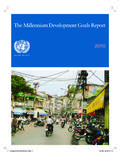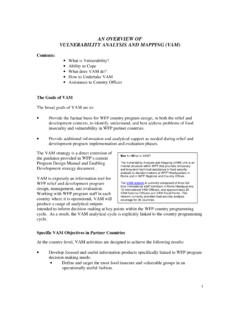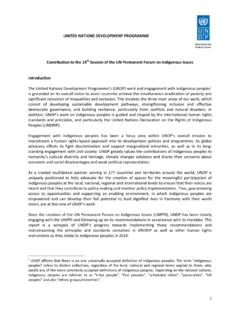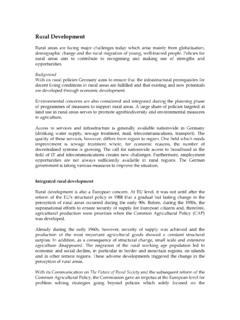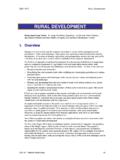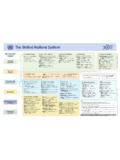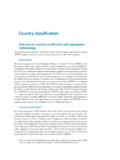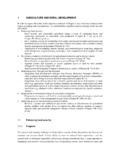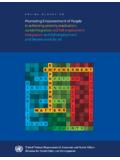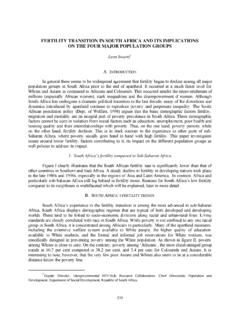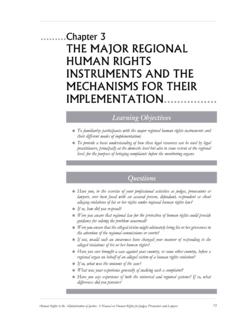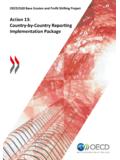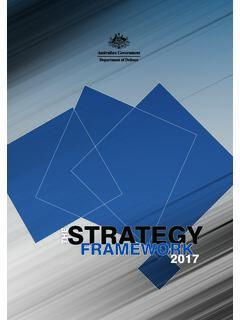Transcription of Expert Group Meeting The role of national mechanisms in ...
1 Division for the Advancement of Women united nations Department for Economic and Social Affairs in collaboration with the united nations regional commissions ECA, ECE, ECLAC, ESCAP and ESCWA Expert Group Meeting The role of national mechanisms in promoting gender equality and the empowerment of women: Achievements, gaps and challenges Hosted by the Government of Italy Rome, 29 November to 2 December, 2004 Opening statement Ms. Carolyn Hannan, Director Division for the Advancement of Women Your Excellency, Minister Stefania Prestigiacomo Madame Director, Prefetto Zotta Distinguished experts and resource persons Observers and colleagues It is an honour and privilege for me to welcome you, on behalf of the united nations , to this Expert Group Meeting on The role of national mechanisms in promoting gender equality and the empowerment of women: achievements, gaps and challenges which has been organized by the united nations Division for the Advancement of Women in collaboration with the five united nations regional commissions.
2 I wish to extend my deep appreciation to the Government of Italy for supporting the efforts to further develop the role of national mechanisms for promoting gender equality and the empowerment of women. I want to particularly thank the Minister for Equal Opportunities, Her Excellency Stefania Prestigiacomo for her commitment and leadership on gender equality and for the encouragement provided for this work. I am also grateful for the Ministry of the Interior for hosting this event at its splendid facilities, Scuola Superiore del Ministerio dell Interno and wish to thank the Director, Prefetto Zotta for the excellent hospitality. Special thanks go to Mr Andrea Cavallari at the Permanent Mission of Italy to the united nations in New York for his interest and support. Finally, I would like to express appreciation for the invaluable logistical support provided by many staff members of the Ministry of Equal Opportunities in the 1preparations of the Meeting .
3 While I cannot mention each one by name here I hope that they will take this as a personal thank you. My special thanks go also to our collaborators in the Expert Group Meeting , the united nations regional commissions, the Economic Commission for Africa, the Economic Commission for Europe, the Economic and Social Commission for Latin America and the Carribean, the Economic and Social Commission for Asia and the Pacific and the Economic and Social Commission for Western Asia. I am delighted to welcome all the distinguished participants. You have travelled from all regions of the world to be present at this important Meeting . I thank the experts for accepting the invitation of the Secretary-General. I also thank and welcome the resource persons representing a variety of national mechanisms - women's ministries, women's commissions, parliamentary caucuses, research institutions, ombudspersons offices and non-governmental organizations - who have come to share their knowledge and experience with the experts and ensure an outcome that is grounded in the concrete realities of national mechanisms .
4 I warmly welcome all other participants - representatives of the host country, observers and colleagues from the united nations system. This Expert Group Meeting builds on the outcomes of intergovernmental processes, such as the World Conferences on Women and sessions of the Commission on the Status of Women. Discussion on the role of national machineries preceded the First World Conference on Women in Mexico City, in 1975. The Mexico Declaration and Plan of Action was the first international instrument to introduce the concept of the national machinery for the advancement of women. The First World Conference on Women called for the establishment of national machineries for the advancement of women to advocate for attention women's advancement, provide policy direction, undertake research and build alliances. Following the First World Conference on Women many national machineries were established in the 1970s and 1980s. The term national machinery for the advancement of women referred to the mechanisms established by government to promote and support the achievement of gender equality, including through implementation of the commitments made in global processes, such as the four world conferences on women.
5 The national machineries established in the 1970s and 1980s included women's ministries and women's departments, bureaus or desks in other ministries with broad mandates covering a number of issues. Because Governments differed, so did the bodies established to promote women's advancement. The subsequent World Conferences on Women in Copenhagen (1980), Nairobi (1985) and Beijing (1995) called for an increase and strengthening of national machineries to support women's advancement and gender equality. A number of constraints in the national machineries established were identified in this process, particularly related to mandate, location, power and resources. Many national machineries were constrained by lack of political will and commitment at the highest 2level, insufficient understanding of gender equality and mainstreaming among government structures, unclear mandates, and structural and communication problems within and among government agencies.
6 Other constraints included a lack of financial resources, lack of expertise and conflicting demands on their scarce time and resources. Particular problems were experienced when women/gender equality units were part of larger ministries with responsibility in a number of areas, as gender equality issues tended to be marginalized in competition for attention and resources. The Beijing Platform for Action (1995) gave specific attention to national machineries under the Critical Area of Concern "Institutional mechanisms " and in Chapter Five on Institutional Arrangements. The Platform for Action brought a new and important element into the work of national machineries - the strategy of gender mainstreaming which aimed to ensure the incorporation of gender perspectives into all areas of development. The main task of national machinery was defined as supporting government-wide mainstreaming of a gender equality perspective in all policy areas (para 201) and encouraging and promoting the active involvement of all institutional actors in the public, private and voluntary sectors to work for gender equality (para 203).
7 The ECOSOC agreed conclusions following up on the global establishment of the gender mainstreaming strategy, highlighted the important role of national machineries. The agreed conclusions emphasized that the responsibility for gender mainstreaming did not lie with specialist individuals or entities, but with management and staff in all bodies. This had implications for national machineries. Rather than focusing solely on separate projects for women, national machineries had a new catalytic role to play in promoting, supporting and monitoring the efforts of other parts of government to give attention to gender perspectives in all areas of their work. This required developing new relationships with line ministries and other key actors. Strategic alliances and partnerships are critical to the effective role of national machineries in relation to gender mainstreaming. Following the Fourth World Conference on Women, discussions on the role of national machineries were held at the regional and sub-regional levels.
8 In 1998, the Division for the Advancement of Women, in collaboration with the united nations Economic Commission for Latin America and the Caribbean, organized an Expert Group Meeting on national Machineries for Gender Equality in Santiago, Chile. The Expert Group Meeting aimed to create a better understanding of institutional and other factors which would stimulate actions, policies and the allocation of resources to strengthen the role, efficiency and effectiveness of national machineries in implementing the Beijing Platform for Action. The main conclusions included, among other things, that the structure and functions of national machineries should be appropriate in the prevailing national social and cultural context, and that an important role of national machineries was effective implementation of gender mainstreaming. The Commission on the Status of Women, at its forty-third session in 1999, where the critical area of concern on institutional mechanisms was considered, stressed that the effectiveness and sustainability of national machineries are highly dependent on their 3embeddedness in the national context, the political and socio-economic system and the needs of and accountability to women.
9 The Commission recommended that national machineries be placed at the highest possible level of government and be invested with the authority and resources needed to fulfill their mandates. It further recommended structuring the functions of national machineries to ensure their effectiveness in establishing gender mainstreaming. The outcome of the twenty-third special session of the General Assembly entitled: Women 2000: Gender equality, development and peace for the twenty-first century pointed out that in many countries national machineries had been instituted or strengthened and recognized as the institutional base for promoting gender equality, gender mainstreaming and monitoring of the implementation of the Platform for Action (para 24). While there have been many important achievements over the past decade, many constraints and challenges persist. A large number of those identified in 1995 still remain. Many national machineries still have very unclear mandates and are uncertain about their functions.
10 They are sometimes caught between awareness of the need to work more constructively with gender mainstreaming and influence policy and programme development at national level from a gender perspective, and the more concrete demands of local constituencies of women who would like to see the national machinery play a more traditional role and implement concrete projects. Many national machineries lack the explicit support from political leadership which would ensure that their roles and work was taken seriously and that there was real potential for developing collaboration with other parts of the government. In some cases, the political leadership leaves everything relating to women and gender equality to the national machinery, which works against gender mainstreaming. Many national machineries are still marginalized structurally in the government. This impedes their access to critical information and decision-making processes. It lessens the potential for successful implementation for gender mainstreaming.
